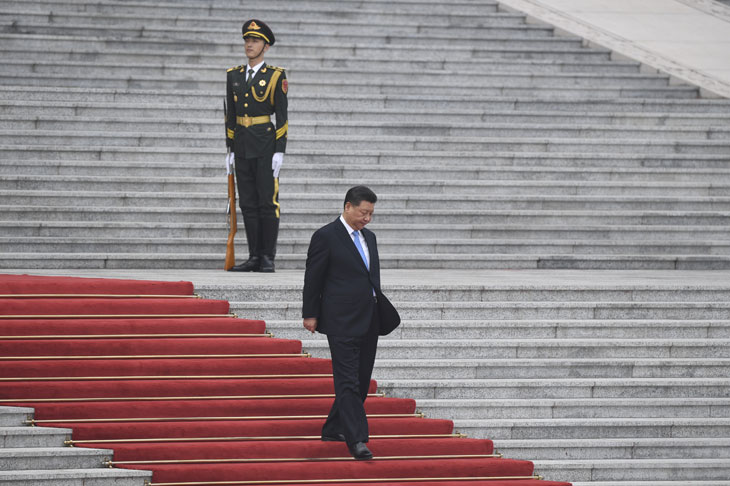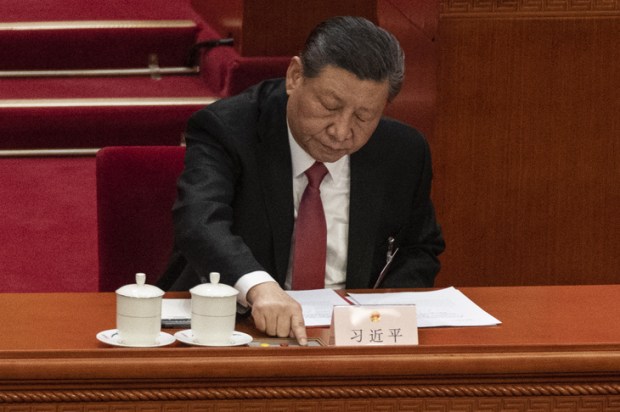Modern China and India were born within two years of each other. India gained independence in 1947 and the Chinese Communist Party finally defeated the Nationalists in 1949 and assumed control of all of the Chinese mainland. In the intervening seven decades, India’s population has grown from 330 million to 1.36 billion and China’s from 541 million to 1.427 billion. There the parallels end.
Despite a shaky start in which as many as 20 million people may have starved to death during the ‘great leap forward’, China began its phenomenal growth in the 1990s and is now the world’s second-largest economy. China’s GDP in 2019 was $US13.61 trillion while India’s was $US2.94 trillion. As China’s economy has become stronger the government’s ability to use economic power for political ends has been matched by a growing willingness to use military power in pursuit of what it sees as its legitimate dominance of the region.
China’s reluctance to countenance an open inquiry into the origins of the Covid-19 pandemic is another example of the way that China will cooperate with other nations only when it is in China’s interests to do so. In exactly the same way in 2016, China refused to accept an independent ruling on the access to disputed areas of the South China Sea and instead has used military force to assume control of any areas which looked promising.
In 1793, in response to an attempt by the British government to establish diplomatic relations with China, the Emperor Qianlong wrote to George the Third telling him that ‘It behooves you, O King, to respect my sentiments and to display even greater devotion and loyalty in future, so that, by perpetual submission to our Throne, you may secure peace and prosperity for your country.’ The Emperor’s letter concluded with the traditional instruction that the recipient should ‘tremble and obey’.
Hu Xijin, the editor of a Chinese government mouthpiece, recently compared Australia to ‘gum stuck to the bottom of China’s shoe’ demonstrating that China’s attitude to the barbarian nations which surround it hasn’t really improved over the past few centuries.
The merchant bankers and hedge fund managers who poured billions of dollars into China over the last thirty years are not responsible for the situation that is emerging, but Western capital did kick-start the modernisation of the Chinese economy and helped to create what will shortly be the largest, strongest economy in the world. It is time that we accept that the Frankenstein monster that the West helped to create is not going to go away or to suddenly turn into a democracy where citizens have the freedoms which we take for granted.
It is time we also started asking why, if China can make such astonishing progress in a generation, India cannot do the same? In theory, India had numerous initial advantages. The educated Indian middle classes all speak English and often with a better command of the language than many native English speakers. India is a democracy and has a legal system based on that of the British and, unlike China’s, India’s courts are independent of the government. India has a vast pool of low-cost labour. It has advanced engineering and technology capabilities and so on and so on. The question remains, why did China advance so rapidly while India languished in the slow lane?
Does a totalitarian state have an inherent advantage over a democracy when it comes to economic development? Clearly not if one compares the two Koreas. Does a non-unionised labour market give an advantage to factory owners? Again the example of South Korea or Japan, which both have heavily-unionised labour markets, especially in the automobile industry, would suggest that the presence or absence of unions, in itself, isn’t a critical issue.
Both India and China are rightly proud of their past civilisations and the roots of both cultures are buried much deeper in the past than Western civilisation, even allowing for our ancient Greek and Roman heritage.
Therein possibly lies the answer to the question of why China got so far ahead of India in such a short period of time. There must be something in Chinese civilisation which has an affinity to the capitalist mode of production which is the principal determinant of economic success in the global economy in our time.
Are the Chinese smarter than the Indians? Although the jury is still out on the question of the relationship between race and intelligence, I think not. But how do we then explain why China has nine universities in the Times global list of the top three hundred universities while India now has none? We have only the shallowest understanding of the way that ‘culture’ influences our behaviour, attitudes and achievements but how else do we explain the different responses when ancient cultures first encounter Western civilisation?
Both India and China have rich literary and musical traditions but it is Chinese musicians who are fast becoming a major part of the global classical music scene. Lang Lang and Wang Yuja are generally recognised to be two of the very finest young classical music pianists in the world today. The orchestras and concert halls and opera houses of the Western world are now filling up with what Niall Ferguson calls ‘the orientalisation of classical music’. China’s appetite for Western classical music means that there are now almost thirty professional classical music orchestras in China today. India has three and continues to prefer its own classical music traditions to those of the West.
I do not suggest that China’s economic success has anything to do with its love of Mozart. However, this demonstrates that, when civilisations brush up against one another, there is no uniform response. The prevailing ideology of the Left is that we are all, (with the exception of Australia’s indigenous community and its unique spirituality) the same. This is a nonsense.
Different civilisations have different talents and different tastes and now the danger of putting all our eggs in one basket has been revealed. If I was a venture capitalist, instead of worrying about when China is going to turn into a liberal democracy, I would look very closely at working out how to transfer those eggs to the Indian basket.
Got something to add? Join the discussion and comment below.
Get 10 issues for just $10
Subscribe to The Spectator Australia today for the next 10 magazine issues, plus full online access, for just $10.
You might disagree with half of it, but you’ll enjoy reading all of it. Try your first month for free, then just $2 a week for the remainder of your first year.














Comments
Don't miss out
Join the conversation with other Spectator Australia readers. Subscribe to leave a comment.
SUBSCRIBEAlready a subscriber? Log in